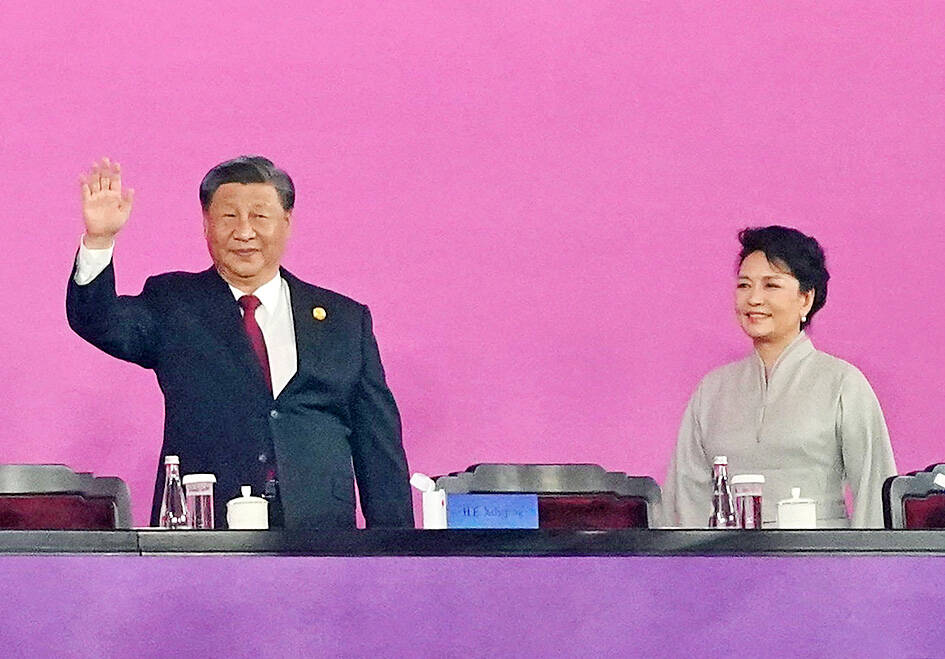South Korea is seeking to have Chinese President Xi Jinping (習近平) visit for the first time in about a decade, seeing a trip as turning a page in relations between the two that have shifted as Seoul more closely aligns itself with the US.
The office of South Korean President Yoon Suk-yeol is working to arrange a visit, a senior government official said at the weekend. The comments came after Xi met South Korean Prime Minister Han Duck-soo on the sidelines of the Asian Games on Saturday and said he would “seriously consider” visiting South Korea, Yonhap news agency reported.
Yoon’s national security adviser Cho Tae-yong in an interview with MBN cable TV on Sunday said that Xi’s visit would be difficult this year, but possible next year.

Photo: Reuters
“It is expected that this will be a turning point in [South] Korea-China relations,” Cho said. “This is the goal we must achieve.”
The movement for a possible visit comes as the US for months has been pressuring security partners including Taiwan, South Korea, the Netherlands and Japan, to comply with sweeping curbs on the sale of advanced chips — a move seen as targeting China’s technology sector.
Xi last visited South Korea in July 2014, becoming the first Chinese leader to visit Seoul ahead of Pyongyang since China established diplomatic ties with South Korea in 1992. During his trip, he discussed ways of curbing North Korea’s nuclear ambitions with then-South Korean president Park Geun-hye and setting up direct won-yuan trading.
Xi on Saturday said that China and South Korea are close neighbors and inseparable partners, and the advancement of bilateral ties serves the common interests of both nations and bodes well for regional peace and development, Xinhua news agency reported.
South Korea is also working to revive a three-way summit with Japan and China — those talks last happened in 2019 and then stalled, initially due to the COVID-19 pandemic and then amid political tensions.
South Korea’s ambassador to Japan in an interview last week said that high-level talks are under way for the summit to happen this year, adding that this would not affect Seoul’s ties with Washington.
The foreign ministers of South Korea and Japan met on the sidelines of the UN General Assembly to help advance a three-way summit and senior officials from the three nations are set to meet in Seoul today.
Yoon has worked with US President Joe Biden to bolster security cooperation to take on threats such as North Korea’s nuclear program and Chinese assertiveness in the Indo-Pacific region.
Yoon has sought a delicate balance between China, his nation’s biggest trade partner, and the US, his nation’s main security ally.
He has also shown support for Biden administration calls to restructure global supply chains to reduce dependence on China, drawing criticism from Beijing.
Beijing has found itself under pressure in the wake of revived cooperation among South Korea, Japan and the US that has bolstered joint military drills, including missile-defense exercises and information sharing.
Their improving relations also led to a historic summit of Biden, Yoon and Japanese Prime Minister Fumio Kishida last month.

The CIA has a message for Chinese government officials worried about their place in Chinese President Xi Jinping’s (習近平) government: Come work with us. The agency released two Mandarin-language videos on social media on Thursday inviting disgruntled officials to contact the CIA. The recruitment videos posted on YouTube and X racked up more than 5 million views combined in their first day. The outreach comes as CIA Director John Ratcliffe has vowed to boost the agency’s use of intelligence from human sources and its focus on China, which has recently targeted US officials with its own espionage operations. The videos are “aimed at

STEADFAST FRIEND: The bills encourage increased Taiwan-US engagement and address China’s distortion of UN Resolution 2758 to isolate Taiwan internationally The Presidential Office yesterday thanked the US House of Representatives for unanimously passing two Taiwan-related bills highlighting its solid support for Taiwan’s democracy and global participation, and for deepening bilateral relations. One of the bills, the Taiwan Assurance Implementation Act, requires the US Department of State to periodically review its guidelines for engagement with Taiwan, and report to the US Congress on the guidelines and plans to lift self-imposed limitations on US-Taiwan engagement. The other bill is the Taiwan International Solidarity Act, which clarifies that UN Resolution 2758 does not address the issue of the representation of Taiwan or its people in

SHIFT: Taiwan’s better-than-expected first-quarter GDP and signs of weakness in the US have driven global capital back to emerging markets, the central bank head said The central bank yesterday blamed market speculation for the steep rise in the local currency, and urged exporters and financial institutions to stay calm and stop panic sell-offs to avoid hurting their own profitability. The nation’s top monetary policymaker said that it would step in, if necessary, to maintain order and stability in the foreign exchange market. The remarks came as the NT dollar yesterday closed up NT$0.919 to NT$30.145 against the US dollar in Taipei trading, after rising as high as NT$29.59 in intraday trading. The local currency has surged 5.85 percent against the greenback over the past two sessions, central

‘MISGUIDED EDICT’: Two US representatives warned that Somalia’s passport move could result in severe retaliatory consequences and urged it to reverse its decision Minister of Foreign Affairs Lin Chia-lung (林佳龍) has ordered that a special project be launched to counter China’s “legal warfare” distorting UN Resolution 2758, a foreign affairs official said yesterday. Somalia’s Civil Aviation Authority on Wednesday cited UN Resolution 2758 and Mogadishu’s compliance with the “one China” principle as it banned people from entering or transiting in the African nation using Taiwanese passports or other Taiwanese travel documents. The International Air Transport Association’s system shows that Taiwanese passport holders cannot enter Somalia or transit there. The Ministry of Foreign Affairs (MOFA) protested the move and warned Taiwanese against traveling to Somalia or Somaliland